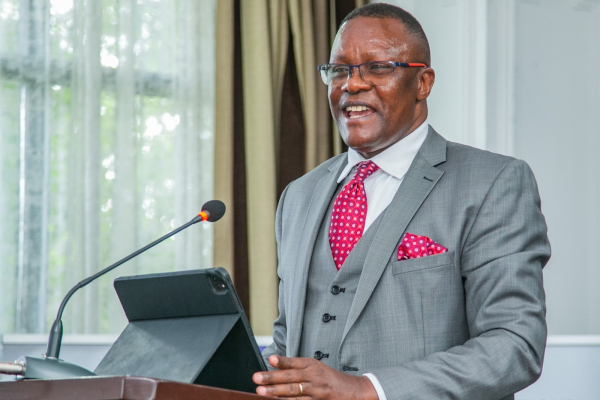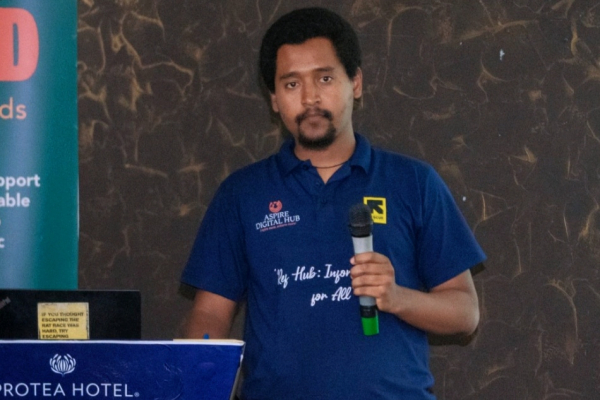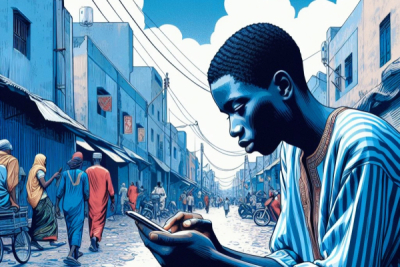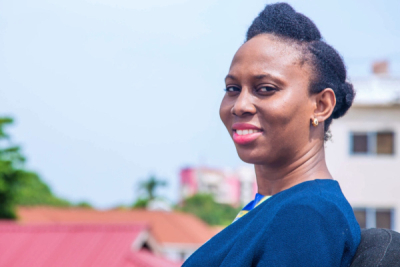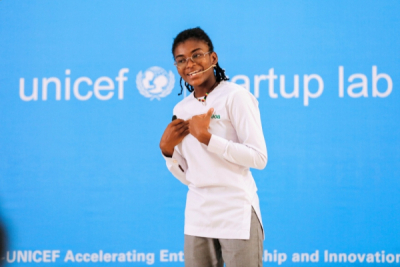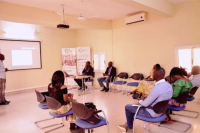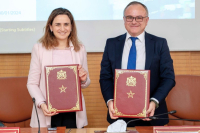Mobile phones are the primary conduit for internet access in Africa, according to the International Telecommunication Union (ITU). This realization prompts several countries to implement strategies for promoting affordable, high-quality handsets.
The East Africa Device Assembly Kenya (EADAK) manufactured 194,000 smartphones in its initial quarter of operation, from October to December 2023, according to an announcement by Kenya’s Minister of Information and Communication Technology, Eliud Owalo (photo).
The local assembly plant, located in Athi River, Machakos County, is part of the government’s initiative to offer high-quality devices at affordable prices. Owalo announced during the 2nd African preparatory meeting for the World Telecommunication Standardization Assembly (WTSA) 2024 in Nairobi on February 5.
He stressed that the domestically assembled phones would bolster the country’s digital inclusion efforts, with the government aiming to produce 3 million smartphones annually. The EADAK factory, a collaboration between the state and several private firms, including Chinese company Shenzhen TeleOne Technology, Safaricom, and Jamii, has created 310 direct jobs for Kenyans.
As of September 2023, 32.63 million of the 64.67 million mobile phones connected to the national telecoms network were smartphones – a penetration rate of 50.5%, according to the latest data from the Kenya Communications Authority. Digital technology is a key component of Kenya’s Vision 2030 economic and social development program.
For the past decade, national authorities have been striving towards this goal through the digitization of public services, the transition to digital payment methods, and the promotion of fintech solutions. The government views increasing access to smartphones as a means to ensure citizens’ access to these digital services and their participation in the 4.0 economy.
The EADAK factory primarily produces smartphones compatible with fourth-generation technology. Owalo disclosed that designs for fifth-generation smartphones are currently underway. Kenya has had an active 5G mobile network since the end of 2022.
An Ethiopian refugee in Uganda, he offers his skills to fellow refugees, providing IT and English language training to aid their integration.
Binyam Meles (photo), an Ethiopian entrepreneur and refugee in Uganda, is dedicated to using his IT skills to support his fellow refugees. A graduate of Addis Ababa University with a Bachelor's degree in Software Engineering, Meles founded Aspire Digital Hub in 2022, a center that leverages information technology to empower young people, refugees, and host communities in Uganda.
Aspire Digital Hub provides English and IT courses to help refugees overcome language and technical barriers, to eliminate illiteracy, idleness, and lack of opportunity. The hub also conducts workshops on personal development and mental health to assist refugees in recovering from trauma, addressing negative mindsets, and realizing their full potential.
Meles' professional journey began in 2018 as a web designer and developer for Need Nutritional Products and Services in Ethiopia. He then gained experience as a trainee software engineer at EthERNet and Ethiopian Airlines from 2018 to 2019. In 2020, he joined the German Agency for International Development Cooperation (GIZ) as a mentor for entrepreneurship and web development. Subsequently, in 2021, he worked as a web designer and developer for LeHem Nutrition Counseling. Upon arriving in Uganda in 2022, he took on the role of a digital literacy consultant for FLIP Africa, an organization that connects young people to short-term job opportunities.
As a member of The Amahoro Coalition, an African initiative that unites various players across the region, Meles continues to make significant contributions to the empowerment and development of refugees and young people in Uganda.
Melchior Koba
Senegalese authorities have restricted mobile internet access, echoing a move made in 2023 during demonstrations in support of opposition leader Ousmane Sonko.
Senegalese authorities suspended mobile internet access nationwide from Sunday evening, citing concerns about "hateful and subversive messages" circulating online ahead of planned protests against the postponement of the presidential election.
The Ministry of Communication, Telecommunications and Digital Economy announced the temporary suspension in a statement late Sunday, saying it aimed to "prevent public order disturbances." The move follows Saturday's announcement by the outgoing president of a delay in the election, sparking calls for demonstrations.
This is not the first time internet access has been restricted in Senegal during politically sensitive periods. In 2023, mobile data was cut for nearly five days following the arrest of opposition leader Ousmane Sonko. Critics have condemned both instances as violations of freedom of expression. The suspension has resulted in a significant financial loss for the Senegalese economy, according to the specialist British platform Top10VPN which put the loss at XOF34.9 billion (nearly $58 million).
The restriction has also impacted various players in the informal sector, including VTC drivers, online vendors, and delivery drivers, for whom mobile Internet is integral to their activities. As of September 2023, the country had 18,595,000 mobile Internet subscribers, per data from telecom regulator ARTP.
Adoni Conrad Quenum
The tech expert provides ICT expertise to various companies. She holds board positions at multiple African firms and has garnered several awards and recognitions.
Ghanaian entrepreneur Ethel Cofie (photo), founder of Edel Technology Consulting, specializes in IT consulting across West Africa and Europe. She offers advice on technological growth in emerging markets. A graduate of Valley View University in Ghana (2005) with a Bachelor's in Computer Science, Cofie holds an MSc in Distribution Systems from the University of Brighton (2007) and an Executive Diploma in Leadership, Business, and Entrepreneurship from the Yale School of Management (2014).
Her firm, Edel Technology Consulting, offers software development, consulting, and training services. The company has completed projects in Ghana, Sierra Leone, Nigeria, and Gambia, with an experienced team. Cofie is also the founder of Women in Tech Africa, a group of women in technology across 30 African countries. She serves as the Chairperson of the ICT Sector Skills Council of the Commission for TVET Ghana, the country's skills regulator and promoter.
Cofie sits on the board of several companies, including Old Mutual Ghana, Worldreader, and Partech Technologies. She is a strategic advisor to the CEO of fintech KudiGo and a trustee of STAR Ghana Foundation. She has also received several awards and accolades, including being shortlisted for the United Nations GEM Tech award in 2014, being named as Africa's most influential businesswoman in the ICT sector by CEO Global in 2016, and being recognized as part of the Technology Excellence Award at the Glitz Africa Ghana Women of the Year Awards in 2020.
Melchior Koba
UNICEF StartUp Lab, an initiative supporting impactful technology-driven startups in Ghana, opened applications for its fourth cohort last week, the organization announced. The six-month program offers selected startups one-on-one mentorship, access to a network of UN partners, funding for prototyping, and various other support mechanisms.
Startups focusing on education, health, child protection, and other areas aligned with UNICEF's mandate are encouraged to apply. Applications close on February 29th.
U.S. satellite internet company Starlink's application for an operating license in Botswana has been rejected due to incomplete information. "There were issues regarding missing requirements with the application, which were identified and pointed out. [...] They are yet to respond to the issues," a source from the Botswana Communications Authority told Techcabal. Botswana is the third country in southern Africa to oppose the deployment of Elon Musk's company, after Zimbabwe and South Africa.
As a start-up incubator, Createam, through its incubation and pre-incubation programs, welcomes and supports entrepreneurs and companies in the fields of ICT, renewable energies, the environment, and agribusiness.
Founded in 2017, Createam is a Malian business incubator that supports and strengthens the performance of startups in various sectors, including information and communication technologies (ICT), renewable energies, the environment, and agribusiness.
Led by Managing Director Souleymane Drave, Createam offers accommodation, consulting, and networking services to help young companies navigate their early stages. It positions itself as a hub for identifying and accelerating promising Malian business talent.
Createam provides a range of programs and services tailored to different stages of a startup's journey. They include pre-incubation, a four-month program that helps project leaders validate their ideas, gather customer feedback, and refine their business models to ensure market fit. There is also an Incubation program that incubates existing companies already generating sales but facing growth challenges for up to three years. During that program, participants receive personalized support, including guidance on accounting, tax management, fundraising, networking, and partnership development. Createam also offers a shared workspace for entrepreneurs to collaborate and network.
Createam has supported several Malian startups, including e-commerce platform Sani-fere.com, online bus ticket booking platform Nextbus, web agency Cat Digital, and Suruku, a website offering discount vouchers to consumers.
The incubator’s mission is backed by several partners, including Orange Mali, Allianz Mali Assurances, Agence française de développement (AFD), Total Mali, Institut des hautes études en management (IHEM), Entreprendre Mali, Mercy Corps, and Diop Fall Associés.
Melchior Koba
Cryptocurrency adoption is growing across Africa, driven by factors such as financial inclusion and diverse uses. However, regulatory ambiguities and security concerns cloud the optimism surrounding the technology.
U.S. financial technology company Visa announced a partnership with Web3 infrastructure provider Transak to offer cryptocurrency withdrawals in fiat currencies to Transak users in 30 African countries, according to a January 30th post on Transak's X account.
The service will utilize Visa Direct, a real-time money transfer solution, allowing users to convert over 40 cryptocurrencies into local fiat for spending at millions of Visa-accepting merchants.
"By enabling real-time card withdrawals through Visa Direct, Transak is delivering a faster, simpler, and more connected experience for its users — making it easier to convert crypto balances into fiat, which can be spent at the more than 130M merchant locations where Visa is accepted," said Yanilsa Gonzalez-Ore, head of Visa Direct and global ecosystem readiness for North America at Visa, in a statement.
Africa has emerged as a global leader in cryptocurrency adoption, with transactions in sub-Saharan Africa reaching $117.1 billion between July 2022 and June 2023, according to Chainalysis data. Nigeria leads the continent with $56.7 billion in transactions during the same period and ranks second globally in the Chainalysis Cryptocurrency Adoption Index.
"We believe this partnership is an inflection point for Web3 as a whole. Now, millions across the globe have a straightforward way to cash out their digital asset holdings to their local currency in real-time and intuitively," said Sami Start, co-founder of Transak.
Adoni Conrad Quenum
In partnership with local and international players, Factory 619 offers a dynamic ecosystem and tailor-made programs to support entrepreneurs in Tunisia.
Factory 619, a global innovation and technology center based in Tunis, has been fostering entrepreneurship and technological advancement since its inception in 2017. The center’s mission is to establish and co-develop enterprises specializing in e-health, gaming, blockchain, and digital transformation.
Led by founders Mehdi Nakouri and Hédi Michau, it offers a broad spectrum of activities and programs, such as hackathons, challenges, networking events, and workshops. The center operates through four divisions: The Studio, The Foundry, The Forge, and The Garage.
The Studio, the center’s inaugural division, champions technological innovation by validating business concepts and transforming them into scalable tech start-ups. To date, The Studio has successfully launched seven startups, including 4Labs, a Software as a Service (SaaS) sales support solution for the pharmaceutical sector.
The Foundry division serves as a launchpad for entrepreneurs to establish startups and grow businesses. It aids CEOs by overseeing the product development process and bolstering commercial endeavors. Additionally, it provides strategic support to the Chief Technology Officer (CTO) for the company’s growth and market entry.
The Forge division provides entrepreneurs with bespoke services in technology, product creation, and innovation programs. The Garage division, on the other hand, cultivates a conducive entrepreneurial environment and fortifies start-ups through pre-incubation and pre-acceleration programs and events.
Factory 619 has forged several strategic partnerships to provide its entrepreneurs with optimal conditions for success. Partners include Tunisian radio station Express FM, the Mediterranean Development Initiative, Nextera, and the Athens Lifelong Learning Institute.
Melchior Koba
Morocco, in its pursuit of a digital transition program, recognizes the critical need for a digitally skilled workforce. The country has strategically partnered with experienced partners to address this challenge.
Morocco’s Ministry of Digital Transition and Administrative Reform on Tuesday announced a program contract with Maroc Numeric Cluster (MNC), a public-private entity, to enhance digital innovation. The contract was signed by Ghita Mezzour, Minister Delegate for Digital Transition and Administrative Reform, and Mehdi Kettani, President of MNC.
The program aims to bolster digital innovation by nurturing talent and aiding startups and SMEs. “This contract reflects the desire of both parties to strengthen the digital innovation ecosystem through several lines of action, including training and integration of talent, content production, dissemination of the culture of innovation, collaboration, and digital entrepreneurship, and support for the emergence of digital innovation projects in various economic sectors,” the Ministry stated.
Under this contract, MNC will undertake a pivotal role in training youth in ICT skills to ease their professional integration. The pilot phase targets 1,000 beneficiaries, with 734 already graduated and an anticipated integration rate of 72%.
The partnership will also promote startups via events, training, and collaboration with incubators, accelerators, professional associations, and partnerships. Regular monitoring, analysis, and studies will be conducted to identify trends and invigorate the sector.
These initiatives are part of Morocco’s new digital strategy, “Maroc Digital 2030”, succeeding the previous strategy that aimed to position Morocco as a leading digital and technology hub in Africa by 2025. The new strategy underscores the importance of talented, creative youth.
Samira Njoya
More...
As 2023 concluded, numerous specialized companies and platforms are evaluating the capital invested in diverse ecosystems. This data holds crucial significance for the growth of the digital economy, particularly in the African tech ecosystem.
African fintech startups raised $852 million in 2023, a 56% decline from the record $1.9 billion secured in 2022, according to the 2023 edition of Partech Africa's Africa Tech Venture Capital report, published in January 2024. The number of deals also dropped by 48%, falling from 217 in 2022 to 113 last year.
Despite the decrease, fintech remains the most attractive sector for investors in Africa, accounting for 37% of all equity financing on the continent in 2023 and 24% of all deals. This is attributed to the sector's strong track record and continued relevance in addressing under-banking and promoting financial inclusion. Of the eight unicorns on the continent, seven operate in the sector, with only Jumia being in the e-commerce sector.
"Fintech plays a critical role in addressing infrastructural challenges in Africa. Beyond just being payment applications, these solutions are essential in enabling a wide range of ventures," the report said. "By establishing both local and cross-border solutions, and fostering key connections between individuals, businesses, and financial institutions, Fintech’s role remains integral to the ecosystem."
Despite the overall funding slowdown, the healthtech and agritech sectors saw growth in 2023. Healthtech funding rose 17% to $212 million, while agritech investments jumped 67% to $144 million compared to 2022.
Adoni Conrad Quenum
South African startup offerZen, which connects tech talent with businesses, announced last week it closed a €4 million funding round. The company plans to use the funds to develop its technology platform and expand its service offerings.
The Algerian entrepreneur initiated a platform designed to tackle the escalating issue of illegal parking. This platform aims to link drivers with vacant parking spots.
Algerian entrepreneur Oudda Abbes, a civil engineering graduate from the University of Science and Technology of Oran Mohamed Boudiaf (USTOMB), heads Garini, a mobile app for parking reservations.
Founded in 2017, Garini partners with property developers, private parking lots, and hotels to optimize their parking space usage. It aims to become a key player in the sharing economy through its parking solutions.
The startup has gained recognition in Algeria, winning first place at the 2020 Tunisian Hackathon and the logistics category at the 2021 Startup Challenge Algeria. In 2022, it was the Algerian winner of the Emerging Mediterranean Bootcamp and placed second at the GEC + Africa Regional Pitch Event. Additionally, it received the "Sustainable Cities" award from the Algerian Ministry of Knowledge Economy in 2023.
Abbes currently manages Oran's large parking lot and real estate company Oudda Isjane Immobilier. Before founding Garini, he worked as an inspection engineer at the National Technical Control of Construction Centre (CTC) from 2010 and later joined Ace Architecture as Senior Manager in 2016.
Melchior Koba
After numerous declarations, global tech giants are gradually deploying their investments in Africa. This time Google is investing in the development of top-tier infrastructure.
U.S. technology giant Google on Wednesday announced the opening of its first data center in Africa, located in Johannesburg, South Africa.
The facility, part of Google's $1 billion investment to boost Africa's digital transformation, is designed to support businesses on the continent with cloud computing resources needed to "evolve, innovate and compete in the global marketplace," according to a company press release.
"This marks our 40th cloud region globally, connecting Johannesburg to our secure global network," the release said, adding the center would offer Google Cloud services to businesses across Africa.
Google estimates Africa's internet economy could reach $180 billion by 2025, representing 5.2% of the continent's GDP. However, Google faces competition in the growing African cloud market. Rivals like Oracle, Amazon Web Services, and Microsoft already have a presence, while local players like Africa Data Centres are also vying for market share.
Adoni Conrad Quenum


